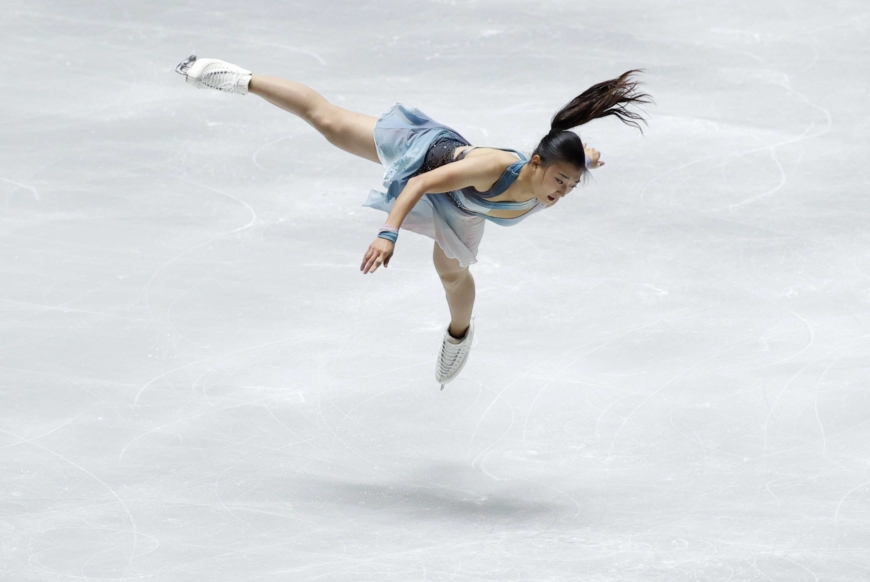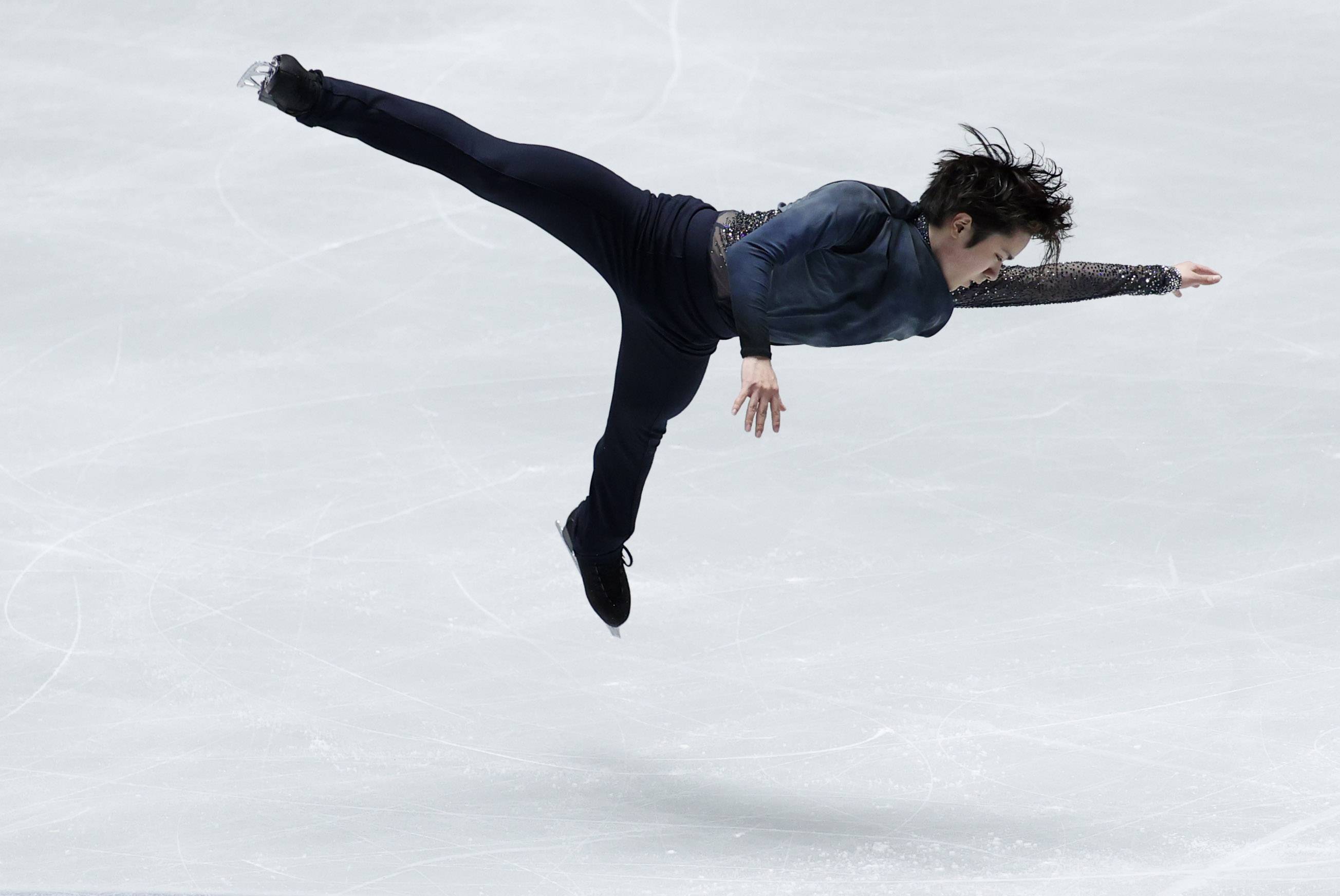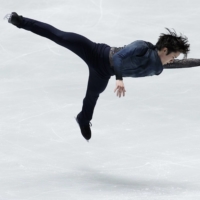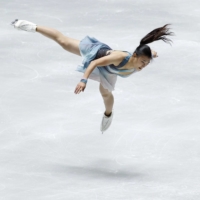Shoma Uno and Kaori Sakamoto ended the first day of the NHK Trophy at the top of the the men’s and women’s single standings, giving the home crowd at Yoyogi National Gymnasium plenty to applaud as the ISU Grand Prix event welcomed a full international roster to the ice for the first time since the 2019 edition.
Despite being the only skater to cross the 100-point barrier with a score of 102.58, Uno expressed disappointment in his short program set to “Oboe Concerto,” admitting that he could have pushed his quad toeloop/triple toeloop combination to completion rather than ending in a double toeloop.
“To be really honest, it’s not really about whether the performance was good or bad, but I think that my combination triple jump became a double,” Uno said. “I’m very disappointed because this season is still long, so now is not the time for me to try to play it safe.
“The fact that I’m not really satisfied ... that’s because I don’t necessarily want to do a good performance, I really want to show that I’m growing.”
Trailing Uno in the standings was Vincent Zhou, who scored 99.51 to his performance set to “Vincent.” The American university student admitted that he felt a strong spotlight on him following last month’s victory in Las Vegas, where he finished nearly 25 points ahead of Uno.
“I definitely noticed that there is more pressure, more expectations coming into this competition,” Zhou said. “But I think I managed to stay in my own zone pretty well, in my own bubble, both figuratively and literally.
“I felt a little bit shaky, my legs were a little bit nervous. I think that reflected in the quality of some of my spins and on the triple axel. I definitely understand why I didn’t reach 100 points, but overall I’m pretty happy with my performance and with the score.”
South Korea’s Cha Jun-hwan ended the night in third with 95.92 points.
“I’m pretty happy about my performance today,” the 20-year-old said. “I think I really worked hard and did my best work today.”
Sakamoto took a confident lead in the women’s competition, scoring 76.56 points with her short program set to the soundtrack from “Gladiator” and impressing judges with her triple flip/triple toeloop.
The 21-year-old, who finished fourth at Skate America in Las Vegas last month, said that while her practice time was limited due to quarantine measures after returning to Japan, she was able to work on improving her jumps — including an opening double axel that earned strong marks from all nine judges.
“I was only able to skate during the time the Japan Skating Federation reserved for me, so I focused on doing my programs,” Sakamoto said. “I also needed to make sure I improved the quality of my jumps so I asked the coaches to help by videotaping me and I was able to do a detailed follow-up which was good.
“It doesn’t matter how hard you practice, you really need to make sure that you give it your all in the last three minutes in the competition.”

Close behind Sakamoto in second place is Kawabe, who spent much of the evening atop the leaderboard after earning 73.88 points with a triple axel — her highest grade of execution — followed by a triple lutz/triple toeloop.
Kawabe, who finished ninth at this year’s Skate Canada and sixth at last year’s NHK Trophy — which took place with a nearly all-domestic field due to pandemic-related travel restrictions — was a late replacement for reigning Japanese champion Rika Kihira, who withdrew last week with an ankle injury.
“I thought I’d be satisfied with a score in the high 60s so I was very happy when I saw the result,” Kawabe said. “I think the lutz is a bigger issue for me than my axel, so I’m happy I was able to transition from that.
“Ending the short program in second has definitely given me confidence, so I would like to maintain this standing in the free program.”
Rounding out the top three was South Korea’s Young You, whose 68.08 placed her slightly above U.S. skater Alysa Liu’s 67.72.
The women’s field was reduced to nine skaters midway through Friday’s session when Russian Daria Usacheva, the second-place finisher at Skate America, withdrew after falling and suffering an injury during warmups.
Japan’s two ice dance duos were in sixth and seventh place after the rhythm dance, with Kana Muramoto and Daisuke Takahashi scoring 70.74 and Misato Komatsubara and Tim Koleto finishing with 68.13. Russia’s Victoria Sinitsina and Nikita Katsalapov lead with 86.33.
Russia’s Anastasia Mishina and Aleksandr Galliamov ended the pairs short program in first place with 78.40, with fellow countrymen Evgenia Tarasova and Vladimir Morozov in second with 75.98. Japan’s Riku Miura and Ryuichi Kihara placed third with 73.98 heading into Saturday’s free skate.
While most fans sat without open seats between them — the latest indication of Japan’s willingness to ease capacity restrictions at sporting events in the wake of subsiding infections and high vaccination rates — they were forbidden from cheering or throwing flowers and gifts onto the ice.



















With your current subscription plan you can comment on stories. However, before writing your first comment, please create a display name in the Profile section of your subscriber account page.